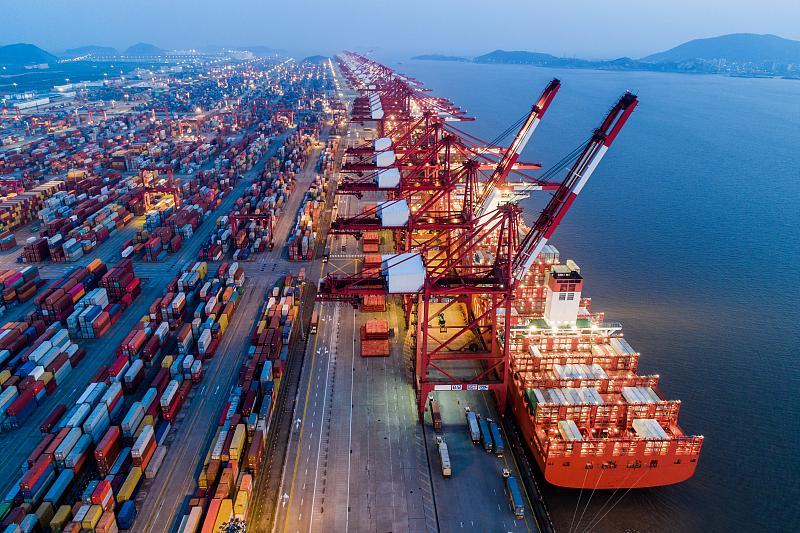Mapping 10 years of China's progress
China.org.cn by Tom Fowdy, October 23, 2022 Adjust font size:

The 20th National Congress of the Communist Party of China (CPC) is currently underway in Beijing. The meeting, the largest and most significant event in Chinese politics and closely watched by the rest of the world, is to determine China's future policy direction, its leadership, and its national goals. With a membership of 96 million people, China's ruling Communist Party is one of the largest parties on Earth.
On this background, the 20th CPC National Congress is an instrument of unity, evaluation, accountability, and consensus building. This poses the question, what has China achieved under its rule in the past decade since the 18th CPC National Congress in 2012? China's economic transformation in the past 10 years has been significant. Since 2012, China's GDP has more than doubled, from $8.5 trillion to $17.7 trillion in 2021, becoming the world's second-largest. As GDP has grown, its GDP per capita has also doubled from around $6,000 to $12,000 per person.
In conjunction with this rapid economic growth, China has expended significant resources on ensuring the benefits of growth are shared throughout society as a whole, which is reflected in its campaign to alleviate extreme poverty, a goal that was reached at the end of 2020. As quoted in a World Bank study: "China has accounted for almost 75% of the global reduction in the number of people living in extreme poverty. In 2021, China declared that it has eradicated extreme poverty according to the national poverty threshold, lifting 770 million people out of poverty since 1978, and that it has built a 'moderately prosperous society in all respects.'"
Manuela V. Ferro, the World Bank's vice president for East Asia and Pacific, has said that China's poverty reduction is "a story of persistent growth through economic transformation." This has also involved relocating 9.6 million from the most impoverished areas, including moving 832 counties out of poverty altogether, with quality of life and living also growing in tandem. In 2021, China's average life expectancy was 75.1 years, and it is now 78.2 years.
China's development has also been characterized by the rapid development of infrastructure, connecting a country that is enormous in size and opening new opportunities. The assembly of the Belt and Road Initiative overseas has created an entire high-speed rail network on an unprecedented scale which now links 75% of cities with a population over half a million and has been increasing at roughly 3,700 km per year. Measuring 37,900 km at the start of 2022, it is expected to reach 70,000 km by 2035. But this is not all. China's infrastructure expansion has been unprecedented across the board, also in terms of airports, highways, metros, and renewable energy transportation. The list goes on.
Beyond individual quality of life, the past decade has also seen China increasingly position itself as one of the world's technological and scientific powerhouses. Research and development spending in the country has almost doubled, from $300 billion in 2012 to a record $564 billion in 2020, according to the most recent data from the Organization for Economic Cooperation and Development. During this decade, China also took the lead in the number of scientific papers published annually out of any country, accounting for 27.2% in 2018, with Chinese scientists publishing over 400,000 a year.
These advances in China's scientific development and research environment have seen the country make progress across a wide range of technologies, including in semiconductors, artificial intelligence, robotics, aviation, supercomputing, and quantum computing, among other areas. In addition, China landed on Mars for the first time and also became the first country to land on the dark side of the Moon and the third country to have retrieved material from the lunar surface. In the past 10 years, China's education sector has also witnessed remarkable progress, with seven Chinese universities being ranked amongst the world's top 100 universities.
China's achievements throughout the past decade have been both tangible and formidable. It is yet another stage in the transformation of a nation that was once an impoverished and agrarian country. How can the world look at this and not give credit where it is due? Under the leadership of the Communist Party of China, the country will ultimately exceed itself, setting goals, working towards them, and achieving them. Although we face many difficulties in the world today, there should be little doubt that China will weather the storm and keep moving forwards.
Tom Fowdy is a British political and international relations analyst and a graduate of Durham and Oxford universities. For more information please visit:
http://www.china.org.cn/opinion/TomFowdy.htm
Opinion articles reflect the views of their authors, not necessarily those of China.org.cn.